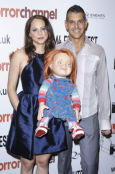Anlässlich der Veröffentlichung von "Curse of Chucky" haben wir ein Gespräch mit Don Mancini, dem Kreativkopf hinter unserer liebsten Mörderpuppe, für euch.

Don Mancini erschuf mit Chucky einer der Ikonen des modernen Horrorfilms und schrieb alle drei Teile der im Original "Child`s Play" genannten Trilogie 1988-1991. Er war außerdem Executive Producer von "Bride of Chucky" (1998) und Regisseur von "Seed of Chucky" (2004).
Im neuesten, ab 24.10.2013 hierzulande auf Blu-ray und DVD erhältlichen Ableger der Reihe, "Curse of Chucky", agiert er als Regisseur und Produzent.
Von Universal Pictures haben wir ein schönes Interview mit Mr. Mancini zur Verfügung gestellt bekommen, das wir euch an dieser Stelle (und im Originallaut) nicht vorenthalten wollen.
 What were the first horror films that stuck in your memory?
What were the first horror films that stuck in your memory?The very first R-rated movie that I saw was "The Omen" (1976). I was about 12 or 13 and that made a huge impression on me. I think it was because I was raised Catholic, so this New Testament-based horror made a big impression on me, but also the amount of blood and gore in that film. I had never seen anything like it before. I had already been interested in filmmaking because I loved disaster movies like "The Towering Inferno" (1974) and "The Poseidon Adventure" (1972). I was very interested in special effects as a kid so when I got into horror part of my interest, initially, was figuring how the gags were done, learning about props and squibs and things like that. Then when I got a little bit older I really gravitated a lot towards Brian De Palma films, and I would say to this day my favourite horror film is "Carrie" (1976). I loved "The Fury" (1978) and "Dressed to Kill" (1980) and from that I discovered Dario Argento.
You liked stylish horror films…Absolutely. My interest in the horror genre as a kid was much more those upscale movies. I was not so much into "The Texas Chainsaw Massacre" (1974), the down and dirty ones. I was really into the movies that melded a really beautiful aesthetic with the violence. On an aesthetic, creative level, that was very interesting to me and my primary interest in the horror genre as a filmmaker was the ability to create something very surreal.
What was the thinking behind "Curse of Chucky" – a franchise reboot?I call it a tonal reboot. I think nowadays "reboot` refers to something that is closer to a strict remake and this is technically a sequel to all the movies, but tonally it is a reboot, going back to the tone of the original trilogy, which is more straightforward horror. After the comedic stuff we did with "Bride of Chucky" (1998) and "Seed of Chucky" (2004), which I loved and which was certainly very successful with "Bride of Chucky" (1998), I wanted to change things. One of the challenges of doing a franchise with multiple films over many years is staying fresh and not wanting to make the same film over and over again. With "Curse of Chucky" (2013) I wanted to do something Gothic and I have never done that specific sub-genre with Chucky before, where all the action takes place in one creepy gothic mansion over the course of one stormy night. I thought it would be interesting to plug Chucky into that realm.
And what led you to create a disabled heroine?A couple of things. Another sub-genre of thrillers that I love is what we can call the ‘handicapped heroine`, the heroine with the special vulnerability, movies like "What Ever Happened to Baby Jane?" (1962) and Audrey Hepburn`s "Wait until Dark" (1967), where she played a blind woman. There is also an Olivia De Havilland movie called "Lady in a Cage" (1964) where this woman is trapped in an elevator while a home invasion is happening. That was very influential for me - even just that image of the elevator that runs up the stairwell. That was part of it. The imagery of a beautiful young woman in a white nightgown in a wheelchair, I knew the iconography that that would bring would be very interesting. Also, it levels the playing field between Chucky and his quarry, because over the years a lot of times naysayers will ask, "Why would anybody be afraid of a two-foot doll? You could just outrun him or kick him!" But this character cannot do that. She is literally on his level and they are forced to deal with one another in a way we have not seen in this franchise.
You cast Brad Dourif`s daughter, Fiona, as your leading lady. That`s a nice touch for fans…Fiona Dourif auditioned along with 300 other actresses and she was so good. I resisted a little bit because it seemed almost too easy, that we should find the lead of this movie in our own back yard as it were. One of the things about Fiona Dourif that I thought made her perfect for this role though, is that I believed her in the wheelchair. It is hard to express but I saw a lot of very good actresses, but I just did not really believe them in the wheelchair. That was a real boon to the production, because she was already well versed in doing wheelies and manoeuvring it around. It is really hard to have an actress do that, because it is almost a perfect prop. It is a prop that is always there and it is very much a part of her character in the way she appears in the wheelchair, the way she operates it. Fiona Dourif had a total mastery of that. Also, she has a specific kind of beauty where I think supernatural things could happen to her; and that is not true of all actresses. It is a subtle thing but it could wreck the whole movie. Fiona Dourif played a witch on "True Blood" (2011) once and there is something about Fiona Dourif that occupies the supernatural realm and that worked for our film.
You must have enjoyed shooting the poison sequence, with the roulette-wheel styled shot at the dinner table…I was really looking forward to that. It was really fun to plan and shoot that sequence. We took an entire day to do that sequence because we all knew it was a real signature sequence for the movie. One of the occupational hazards of doing a horror franchise for the same character is that you have to constantly think up new ways to kill people and Chucky had never done that before. He had never poisoned anyone before so I thought that would be really interesting. I am glad that you picked up on the roulette-wheel imagery because that is precisely what I wanted it to look like. It was important that we were able to get to do that crane shot with the camera rising above the table. Having established that one out of six of the bowls had been poisoned, you lose track of and you do not know who is going to get the poison. It was actually a concept for a scene that I had many years ago and it is something I knew could be a great prescription for suspense. Also, because with this movie we are trying to go back to horror, it was important to create set pieces in which the simple sight of a static doll would create suspense. I knew that this scene fits that Hitchcock prescription for suspense, where he talks about the baseball metaphor - if a couple of people at the table are talking about baseball it would be utterly boring, but if you show the audience that unbeknownst to those characters there is a bomb ticking under the table, suddenly that conversation becomes fraught with tension and that was something I was trying to do in that scene.
Why do you think that the Chucky franchise has endured so well?Part of it is Chucky himself, down to Brad Dourif`s performance. It is the efforts of the puppeteers, led by Tony Gardner. There is something delightful about Chucky. I know that when we are on set working with Chucky people are always delighted because it is just fascinating to see this doll come to life. On a dramatic level, it is a couple of things. One, there is the Freudian primal response people have to dolls coming to life. I just think there is something very powerful about that. Certainly, I did not create that; we have seen that in "Twilight Zone" (1959) episodes and "Trilogy of Terror" (1975) with Karen Black. But I realized when I wrote the first script, it had never been done in such a way that the doll was treated like a full-fledged character that had a real personality and in the end would have pages and pages of dialogue. Finally, part of it is that for young people, Chucky often goes after authority figures and I think that kids really like to see that. They like to see Chucky pervert the status quo, although in the end they like to see him get his.
Can you describe your own relationship with Chucky after all these years?It is pure love. I was a horror fan from the time I was a little kid and if you had told my 10-year-old self that I would create a character that would become so embraced by movie audiences I would have said, "I don`t need to do anything else." I actually get that rude question from people sometimes. They say to me, "How come you don`t do anything other than Chucky? Why are you such a one trick pony?" And I go, "It is a good trick!"
What are your plans for another instalment?Besides the musical? Really, I am only one per cent kidding with that! One day I would love to do a Chucky musical, even on the stage. It would be awesome. In terms of movies, I definitely have an idea for the next one. Hopefully, we have not seen the last of Chucky. They will do another one with or without me but as I created it, I feel proprietary about it. I do not really want to let go just yet.